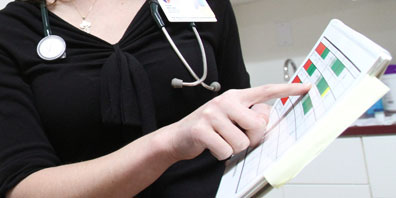
 A new federal mandate requiring nearly all health insurance plans to cover contraception and sterilization is an attack on religious liberty that could have devastating effects on the Catholic Church and its ministries, church leaders say.
A new federal mandate requiring nearly all health insurance plans to cover contraception and sterilization is an attack on religious liberty that could have devastating effects on the Catholic Church and its ministries, church leaders say.
Bishop Robert E. Guglielmone of the Diocese of Charleston said he has joined bishops nationwide in protesting the Jan. 20 announcement by the U.S. Department of Health and Human Services.
The ruling requires most private health plans to offer coverage that includes FDA-approved contraception, sterilization and abortion-inducing drugs. They are part of a list of preventive services that are available without co-pays through the 2010 Patient Protection and Affordable Care Act. Almost all employers, including religious ones, must provide the coverage for employees.
Bishop Guglielmone sent a letter about the issue to parishes the first weekend of February (www.catholic-doc.org). He condemned the ruling, and urged the faithful to pray for it to be overturned and to contact their legislators.
“My concern is this just opens the door in terms of the violation of First Amendment rights, and my direct concern is what the ruling is going to do to the church, primarily how it is going to affect social service agencies, schools and hospitals,” Bishop Guglielmone said in an interview with The Miscellany. “I really thought there would be a certain respect for religious liberty not only for Catholics but for all people, but that doesn’t seem to be the case at all … there is no way this ruling in its present form can work for the Catholic Church.”
The United States Conference of Catholic Bishops, the Catholic Health Association of the United States, and other church organizations also protested the ruling.
Cardinal-designate Timothy M. Dolan, archbishop of New York and president of the USCCB, called the decision “literally unconscionable.”
The ruling gives religious employers who do not currently offer the coverage a year to comply with the new regulations.
“Unless the rule is overturned, we Catholics will be compelled either to violate our consciences, or to drop health coverage for our employees (and suffer the penalties for doing so),” Bishop Guglielmone wrote in his letter.
The ruling offers a narrow exemption for religious organizations that hire and serve primarily people of their own faith, and whose main purpose is to teach religious doctrine.
Bishop Guglielmone said some parishes might meet that criteria, but most schools and social services such as Catholic Charities would not. The decision would also affect the Diocese of Charleston itself because many of its employees are not Catholic.
“It would appear you have to verify that not only your employees are primarily Catholic, but so are all those you serve,” Bishop Guglielmone said.
“With Catholic Charities, for instance, we reach out to everybody who is in need, and in the state of South Carolina, it’s kind of obvious that many of those we reach out to are not Catholic,” he continued.
Catholic hospitals would also be affected by the mandate.
“The only way we could meet the definition of the exemption is to hire only Catholics as employees and provide health care to only Catholics,” said Sister Judith Ann Karam, president and CEO of the Sisters of Charity Health System which runs the Providence hospitals and other facilities in Columbia and the Midlands.
“My community has been part of the fabric of South Carolina since 1938, and we have never taken care of only Catholics,” she said.
Sister Judith Ann said the ruling’s definition of “religious employer” leaves church health providers and others out in the cold when it comes to freedom of conscience.
“The choice they made really narrows that definition and sets aside the protection we have had for over 40 years in exercise of our Catholic ministry,” she said. “One in six people who seek healthcare are cared for in Catholic hospitals. Our social services are part of the fabric of every part of the United States. To be mandated to do something directly in opposition to the moral ethics we believe are important is extremely disappointing.”
Bishop Guglielmone urged people to learn more about the issue and learn how to contact their elected representatives by visiting the U.S. Bishops website at www.usccb.org/conscience.
“A lot of people don’t seem to understand the gravity of this situation,” he said. “Religious freedom obviously is an important issue in this ruling, but requiring every insurance policy to provide coverage for these things goes beyond that to violating some other very basic freedoms.”
UPDATED: Feb. 9, 2012
